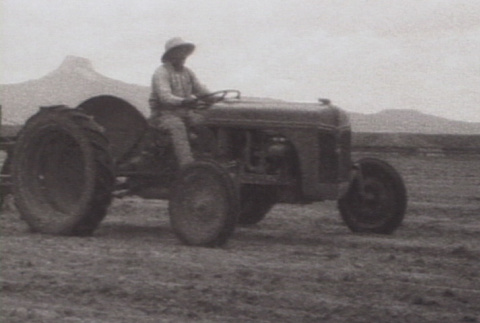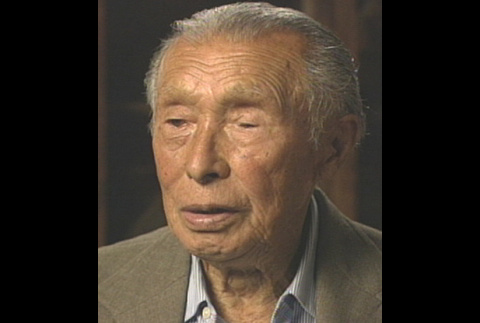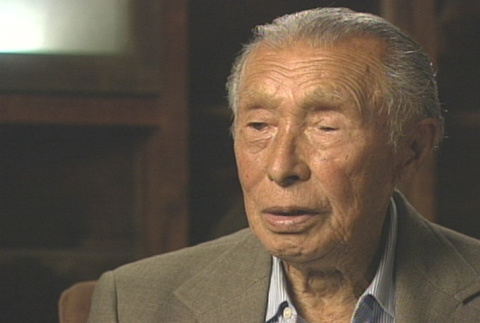82 items
82 items
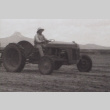
vh
Eiichi Edward Sakauye Interview I Segment 19 (ddr-densho-1005-1-19)
Taking several trips to Yellowstone
Eiichi Edward Sakauye shot footage of the Heart Mountain concentration camp, Wyoming, from 1943-1945, on 8 mm film. This interview is of Mr. Sakauye providing voice-over descriptions for his original footage.

vh
Eiichi Edward Sakauye Interview I Segment 23 (ddr-densho-1005-1-23)
Cultural performances in camp
Eiichi Edward Sakauye shot footage of the Heart Mountain concentration camp, Wyoming, from 1943-1945, on 8 mm film. This interview is of Mr. Sakauye providing voice-over descriptions for his original footage.

Narrator Eiichi Edward Sakauye
Nisei male. Born January 25, 1912, in San Jose, California. Grew up in San Jose, working on family's extensive farmholdings, and graduating from San Jose Teachers College. After the bombing of Pearl Harbor, was removed to Santa Anita Assembly Center, California, and Heart Mountain concentration camp, Wyoming. While at Heart Mountain, became the agriculture superintendent, and …
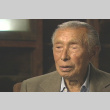
vh
Eiichi Edward Sakauye Interview II Segment 21 (ddr-densho-1005-3-21)
FBI search of home; retaining family home and farm during the war

vh
Eiichi Edward Sakauye Interview II Segment 15 (ddr-densho-1005-3-15)
Deciding not to get married before World War II

vh
Eiichi Edward Sakauye Interview II Segment 1 (ddr-densho-1005-3-1)
Becoming interested in photography at an early age

vh
Eiichi Edward Sakauye Interview II Segment 19 (ddr-densho-1005-3-19)
Observing tensions within camp

vh
Eiichi Edward Sakauye Interview II Segment 12 (ddr-densho-1005-3-12)
Continuing to farm in the Santa Clara Valley postwar

vh
Eiichi Edward Sakauye Interview II Segment 16 (ddr-densho-1005-3-16)
Thoughts on the draft resistance issue and Ben Kuroki's visit to Heart Mountain

vh
Eiichi Edward Sakauye Interview II Segment 14 (ddr-densho-1005-3-14)
Working as a weather monitor in difficult camp conditions

vh
Eiichi Edward Sakauye Interview II Segment 2 (ddr-densho-1005-3-2)
Finding a way to spare movie camera during mass removal, reobtain it in camp

vh
Eiichi Edward Sakauye Interview II Segment 5 (ddr-densho-1005-3-5)
Filming recreational activities in camp

vh
Eiichi Edward Sakauye Interview II Segment 20 (ddr-densho-1005-3-20)
Teaching children about nature through camp gardens

vh
Eiichi Edward Sakauye Interview II Segment 7 (ddr-densho-1005-3-7)
Appointed as a custodian for government-stored belongings

vh
Eiichi Edward Sakauye Interview II Segment 22 (ddr-densho-1005-3-22)
Reflections: importance of preserving history, the hardships faced by the Issei generation

vh
Eiichi Edward Sakauye Interview II Segment 13 (ddr-densho-1005-3-13)
Impact of camp photographs and film footage on future generations

vh
Eiichi Edward Sakauye Interview II Segment 8 (ddr-densho-1005-3-8)
Establishing an agricultural project on previously unfarmed land

vh
Eiichi Edward Sakauye Interview II Segment 4 (ddr-densho-1005-3-4)
Turning barrack into a darkroom to develop film

vh
Eiichi Edward Sakauye Interview II Segment 6 (ddr-densho-1005-3-6)
Helping to develop a successful agriculture program at Heart Mountain

vh
Eiichi Edward Sakauye Interview II Segment 3 (ddr-densho-1005-3-3)
Receiving permission to film scenes in camp: the difficulty of obtaining film


vh
Eiichi Edward Sakauye Interview II Segment 10 (ddr-densho-1005-3-10)
Showing home movie footage of camp to Walter Cronkite

vh
Eiichi Edward Sakauye Interview II Segment 11 (ddr-densho-1005-3-11)
Encountering prejudice after the war

vh
Eiichi Edward Sakauye Interview II Segment 9 (ddr-densho-1005-3-9)
Importance of cooperation among camp residents and administration
